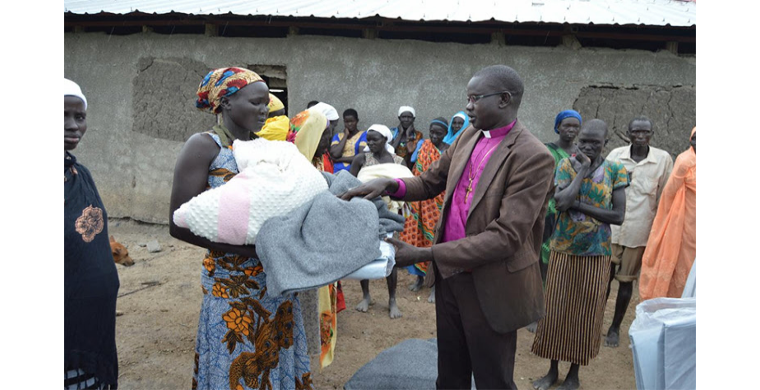SOUTH SUDAN FACES FLOODS, VIOLENCE AND SCHISM
Defrocked bishop explains actions
By Chris Sugden
Evangelicals Now
November 2020.
Bishop Zechariah travelled with the goods from Juba and was able to distribute them personally to those most affected by the floods. -- PHOTO
Following heavy rainfall and flooding, Anglican International Development received an urgent call for help from Bishop Zechariah Manyok from Wanglei Diocese in Jonglei State, South Sudan, where he leads a group of faithful Christian congregations.
Across the region, flooding was widespread. Parts of the town of Bor on the White Nile were inundated. Relief agencies worked to help across affected regions. But Wanglei is a remote area in Jonglei, and during the wet season it is completely cut off by road. Unlike the major centres of population affected by flooding, Wanglei came very low down the priority list because it is a small and isolated region. Yet over 3,500 families were affected, many with young and vulnerable people who urgently needed to leave their flooded homes for higher ground
Pastor and 32 others murdered
All this unfolded against the backdrop of continuing violence in war-torn South Sudan: at the beginning of August the cathedral in the neighbouring diocese of Athooch was attacked and at least 32 people, including the Dean, Daniel Garang Ayuen, one of the few well-educated pastors in the diocese, were killed. Gunmen stormed the compound, vandalised the church, destroyed their worship instruments and set the area ablaze along with the entire neighbouring village.
Violent Islamisation
South Sudan came into existence following prolonged civil war starting in 1956, by which the northern Islamist government pursued violent Islamisation and Arabisation of its southern non-Muslim and African communities, based on the Islamic view that Islam should exercise global control.
Dr Patrick Sookhdeo, in his new book Understanding Living Islam (ISAAC Publishing 2020), notes that 'Arab Muslim soldiers from the north were encouraged (by the government) to marry the Southern women (that is, Christian or animist Africans) whom they captured.' A peace agreement in 2011 allowed the South to secede.
However, the long experience of violence used against them appears to have schooled the population of South Sudan in using violence to settle disputes. So, though about 90% of Jonglei State are Christians, they are from many different tribes, and communal violence has intensified.
Repressive security
South Sudan's President Kiir has never faced the voters of independent South Sudan, building instead a repressive security apparatus to keep him in power. Kiir has led South Sudan since John Garang's 2005 death in a helicopter crash. At independence, Kiir's appointment was extended and elections were planned for 2015. In late 2013, a power struggle between Kiir and Vice President Riek Machar plunged the nation into civil war. Almost 400,000 South Sudanese were killed, and another 4.3million -- about a third of the population -- fled their homes due to widespread rape and ethnic massacres.
Kiir exploited the chaos to delay elections, from 2015 to 2018, and then to 2021. South Sudan's leaders reached a peace agreement in 2018, but failed to create a government until February 2020. The ceasefire is fragile, and intercommunal violence flares.
Responding to the flooding
Working with the South Sudan Red Cross (SSRC), Bishop Zechariah identified that an early delivery of certain supplies to help 400 of the most vulnerable families would make a significant, life-saving difference, including countering the threat of malaria.
Anglican International Development (AID), which has worked with the Anglican Church in South Sudan since 2008, drew up an emergency relief package with Bishop Zechariah and the SSRC, and raised £10,000 to enable plastic sheeting (to make rafts to enable families to evacuate from flooded homes), blankets and mosquito nets to be flown to the Wanglei area. The rafts were used to transport children, livestock and possessions to higher ground. Blankets helped to keep children and vulnerable people warm and the mosquito nets protected against malaria, which is particularly prevalent during flooding when the insects are able to lay their eggs on standing water.
AID has also been able to allocate excess funds to a similar response in Gondokoro where Trumpeter Community Health is active.
Defrocked archbishop
Since the flooding, church leaders have been occupied for almost a month of daily meetings in Juba concerning the defrocked archbishop of Jonglei Internal Province.
On 14 August 2020, the Primate Dr Justin Badi had defrocked Archbishop Ruben Akurdid for consecrating three bishops against the Constitution and Canons of the Church.
The defrocked archbishop refused to step down. Instead, he decided to mobilise members of his clan and call himself independent within the Episcopal Church of South Sudan (ECSS). These so-called independent ECSS Christians threatened the Church with violence and warned that there would be the sound of guns in Bor if the bishops of Jonglei were to go to Bor.
Bishop Zechariah and his colleagues had decided the previous week to go and organise the Diocese. After this decision community leaders called for the defrocked archbishop to come to Juba to explain who was behind these threats.
Akurdid came to Juba and has been explaining what is going on. Bishop Zechariah and his colleagues have been part of these meetings and, despite the threats, decided to travel to Bor.
END














